- Home
- Octavia E. Butler
Fledgling Page 11
Fledgling Read online
Page 11
“You want me to be part of such a community?” she asked.
“I do, but not yet.”
“Not … yet?”
“My father is having a house built for me. Come to me when the house is ready. I’ll see to it that there’s space for your books and other things—a place where you can write your poetry.”
“How long?”
“I don’t know. No more than a year.”
She shook her head. “I don’t want to wait that long.”
I was surprised. I had been careful to let her make up her own mind, and I had believed she would come with me, but not so quickly. “I have nothing to offer you now,” I said. “I’ll be living in rooms in my father’s house. He says you can come, but when I saw what you have here, I thought you’d want to wait until you could have something similar with me.”
“I have no patience,” she said. “I want to be with you now.”
I liked that more than I could have said, and yet I wondered about it. “Why?” I asked her. I had no idea what she would say.
She blinked at me, looked surprised, hurt. “Why do you want me?”
I thought about that, about how to say it in a way she might understand. “You have a particularly good scent,” I said. “I mean, not only do you smell healthy, you smell … open, wanting, alone. When I came to you the first time, you were afraid at first, then glad and welcoming, excited, but you didn’t smell of other people.”
She frowned. “Do you mean that I smelled lonely?”
“I think so, yes, longing, needing …”
“I didn’t imagine that loneliness had a scent.”
“Why do you want me?” I repeated.
She hugged me against her. “I am lonely,” she said. “Or I was until you came to me that first time. You’ve made me feel more than I have since I was a girl. I hoped you would go on wanting me—or at least that’s what I hoped when I wasn’t worrying that I was losing my mind, imagining things.” She hesitated. “You need me,” she said. “No one else does, but you do.”
“Your family?”
“Not really, no. This is my home, and I’m glad to be able to help my daughter and her husband by having them come live here, but since my husband died, all I’ve really cared about—all I’ve been able to care about—is my poetry.”
“You would be able to bring only some of your things to my father’s house,” I said.
“A few boxes of books, some clothing, and I’ll be fine.”
I looked around the room doubtfully. “Wright and I will be moving tomorrow. I’ll need your telephone number so I can reach you. If you don’t change your mind, we’ll come back for you and your things the Friday after next.”
“Promise me.”
“I have.”
“Will you stay with me tonight?”
“For a while. Have you eaten?”
“Eaten?” She looked at me. “I haven’t even thought of eating, although I suppose I’d better. Do you eat regular food at all, ever?”
“No.”
“All right. Come keep me company in the kitchen while I microwave something to eat. I don’t think I should miss very many meals if I’m going to be with you.”
“Exactly right,” I said, and enjoyed every moment of the flesh-to-flesh contact when she bent and kissed me.
Ten
No one came for us on Friday.
When the night was half gone, Wright tried to phone Iosif—tried each of the numbers he had given us. At first, there was no answer, then there was a computerized voice saying that the number he was calling was out of service. He made several fruitless attempts.
“We need to go there,” I said.
He looked at me for a moment, then nodded. “Let’s go,” he said.
I grabbed a blanket from the bed, thinking that we might have to spend part of the coming day in the car. I didn’t want to think about why that might happen, but I wanted to be ready for it. Thoughts of the burned-out ruin that had been my mothers’ community jumped into my mind, and I couldn’t ignore them.
Wright was not certain how to reach Iosif’s community. His maps didn’t show the tiny community, of course. Iosif’s card contained a sketch of a map that turned out to be hard to follow. We got onto what seemed to be the right side-road, but found no turn off where Wright had expected one. We tried another side road, then another, but still did not find the community.
Finally, I did what I hadn’t wanted to do.
“This is no good,” I said. “We’re in the right general area. Find a place to park, and I’ll go out and find the community. I can find it by scent if not by sight.”
He didn’t want me to go. He wanted to keep driving around or, if necessary, go home and try again during the day.
I shook my head. “Find a safe place and park. I need to go to them and see that they’re all right. And if … if they’re not all right, if this is anything like what happened to my mothers, you can’t be there. If my father or my brothers are injured, they’ll be dangerous. They might not be able to stop themselves from killing you.”
“And eating me,” he said. He didn’t even make it a question.
I said nothing for a moment, stared at him. Had the human symbionts told him or had he guessed? I hated that he knew but clearly, he did know. “Yes,” I admitted finally. “That’s probably what would happen. Park and wait for me.”
He parked on the highway at a place where the road’s shoulder was wide. “This will do as well as anywhere,” he said. “If anyone wants to know what I’m up to, I got sleepy and decided to play it safe and catch a nap.”
“If you have to move,” I said, “wait for me somewhere south of here along the road. I’ll find you. If you have to leave the area—”
“I won’t leave you!”
“Wright, hear me. Do this. If you’re in danger from the police, from an Ina, from anyone at all, leave me, go home. I’ll get there when I can. Don’t look for me. Go home.”
He shook his head, but he would do it. After a moment, he said, “You honestly believe you could find your way to my cabin from here?”
“I could,” I said. “If I have to, I will.” I took his hand from where it was still resting on the steering wheel. Such a huge hand. I kissed it then turned to go.
“Shori!” he said.
I had opened the door to get out of the car, but his tone stopped me.
“Feed,” he said.
He was right. I was probably going to have to cover a few miles and face I-didn’t-know-what. Best to be at full strength. I shut the door and kneeled on the seat to reach him. He lifted me over onto his lap, kissed me, and waited.
I bit him deeply and felt him spasm and go hard under me. I hadn’t bitten him this way for a week, hadn’t taken a full meal from him. I had hoped we would share this night in our new quarters. I liked to take my time when I truly fed from him, tear sounds from him, exhaust him with pleasure, enjoy his body as well as his blood. But not now. I took his blood quickly, rocking against him, then stayed for just a few minutes more, licking the wound to begin its healing, comforting him, comforting myself. Finally I hugged him and got out of the car. “Stay safe,” I said.
He nodded. “You too.”
I left him and began to run. We were in the right general area but were, I thought, south of our target. Wright had turned off too soon. I ran along the road, alert for cars and for a telltale wisp of scent. I was moving in a generally northerly direction through woods, alongside a river that sometimes veered away from the road and sometimes came close to it. I passed the occasional house, cluster of houses, or farm, but these were strictly human places.
After a while I did catch a scent. I didn’t bother about finding the side-road. I followed the scent cross-country through the woods, past a house that had been almost completely hidden by trees. I didn’t care about private property or rugged terrain. All I cared about were the scents drifting in the air and what they could tell me. I stopped every now and then to t
ake a few deep breaths, turning into the wind, sorting through the various scents. Running, I might miss something. Standing still, eyes closed, breathing deeply, I could sort through far more scents—plant, animal, human, mineral—than I wanted to bother with.
There was a gradual change. After a while, what I smelled most was smoke—old smoke, days old, and ash clinging to the trees, stirred up by my feet, by the feet of animals, by cars on the narrow little roads I crossed.
Smoke and burned flesh. Human flesh and Ina flesh.
When I found my father’s and brothers’ homes, they looked much like the ruin of my mothers’ community. The buildings had been completely destroyed, burned to rubble, and then trampled by many feet. My father and my brothers had been there, but they were gone now. I could smell death, but I could not see it. I did not know yet who had died and who had survived. Someone had come for my male family, and whoever it was had been as thorough as they had when they came for my mothers and my sisters.
The place that had been Iosif’s community was full of strange, bad smells—the scents of people who should not have been there, who had nothing to do with Iosif or his people. Whose scent was I finding? The arsonists? Firemen? The police? Neighbors? All of these, probably.
I stood amid the rubble and looked around, trying to understand. Was Iosif dead? And Stefan? I hadn’t even met my other three brothers and their symbionts. All dead? None wounded and surviving in hiding?
Then I remembered that some of Iosif’s symbionts worked away from the community, even lived away from it part of the time. Did they know what had happened? If they didn’t, they would be coming back here soon. They would come, needing Iosif or one of my brothers. When they found out what had happened, they would have to find another Ina to bond with just to survive. Could I help? Was I too young? I was definitely too ignorant. Surely they would know of other Ina communities. If they had come home and found only rubble, they might already have taken refuge in some other community.
When had the fire happened? Days ago, surely. The place was cold. Even the freshest human smells I found were all at least a day or two old.
Who had done this and why? First my mothers’ community, now my father’s. Even Iosif had had no idea who attacked my mothers. He had been deeply angry and frustrated at his own ignorance. If he didn’t know, how could I find out?
Someone had targeted my family. Someone had succeeded in killing all of my relatives. And if this had to do with the experiments that had given me my useful human characteristics—what else could it be?—then it was likely that I was the main target.
I began to run again, to circle the community, stopping often to sample scents more thoroughly and hunting for fresh scents, any hint that some member of my family might be alive, hiding, healing. I found the narrow private road that led to where the houses had been, and I followed it out to a two-lane public road. There, I closed my eyes and turned toward where Wright was waiting. I could get back to him in half an hour.
But I didn’t want to go back to him yet. I wanted to learn all I could, all that my eyes and my nose could tell me.
I went back to the rubble—charred planks, blackened jagged sections of wall, broken glass, standing chimneys, burned and partially burned furniture, appliances, broken ceramic tile in what had been the kitchens and the bathrooms, unrecognizable lumps of blackened plastic, a spot where an Ina had died …
I stood still at that place, trying to recognize the scent, realizing that I couldn’t because it was the wrong scent, that of a dead male whom I had not met, burned to ash and bone, definitely dead.
I had not known him. He must have been one of my brothers but one I had not met. He had died in one of the three houses I had not entered.
I stared at the spot for a long time and caught myself wondering what the Ina did with their dead. What were their ceremonies? I knew something about human funeral services from my vampire research. I had read through a great deal of material about death, burial, and what could go wrong to cause the dead to become undead. It was all nonsense as far as I was concerned, but it had taught me that proper respect for the dead was important to humans. Was it important to Ina as well?
What had been done with the remains of both my male and my female families? Had the police taken them? Where would they take them? I would have to talk to Wright about that and perhaps to Theodora. She worked at a library. If she didn’t know, she would know how to find out.
But if I somehow got the remains, what could I do but bury them or scatter their ashes after, perhaps, a more thorough cremation? I didn’t know any Ina rituals, any Ina religion, any living Ina people.
I found another place where someone had died—a symbiont this time, a female. I had not met her. I was grateful for that. After a while, I made myself go to the house that had been my father’s. I walked through it slowly, found two spots where symbionts I did not know had died. Then I found two that I did know—the two men I had met in Iosif’s huge front room, Nicholas and Yale. I stood for a long time, staring at the spots where the two men had died. I had not known them, but they had been healthy and alive only a week before. They had welcomed me, had been friendly to Wright. It did not seem possible that they were dead now, reduced to two smudges of burned flesh that smelled of Iosif and of their own individual human scents.
Then, in the remains of what must have been a large bedroom, I found a place that smelled so strongly of Iosif that it had to be the spot where he died. Had he tried to get out? He was not near a window or a door. I got the impression that he was lying flat on his back when he died. Had he been shot? I found no bullets, but perhaps the police had taken them away. And if there had ever been a smell of gunpowder, it had been overwhelmed by all the other smells of burning and death. Iosif had certainly burned. A small quantity of his ashes were still here, mixed with the ashes of the house and its contents.
He was definitely dead.
I stood over the spot, eyes closed, hugging myself.
Iosif was dead. I’d hardly begun to know him, and he was dead. I had begun to like him, and he was dead.
I folded to the ground in anguish, knowing that I could do nothing to help him, nothing to change the situation. Nothing at all. My family was destroyed, and I couldn’t even grieve for them properly because I remembered so little.
“Shori?”
I jumped up and back several steps. I had been so involved with my thoughts and feelings that I had let someone walk right up to me. I had heard nothing, smelled nothing.
At least I could see that I had startled the person who had surprised me. I had moved fast, and it was dark. She was looking around as though her eyes had not followed my movement, as though she did not know where I had gone. Then she spotted me. By then I understood that she was human and that she didn’t see very well in the dark, that she smelled of my father and that I knew who she was.
“Brook,” I said.
She looked around at the devastation, then looked at me, tears streaming down her face.
I went to her and hugged her, as she had hugged me when we met. She hugged back, crying even harder.
“Were you here when this happened?” she asked finally.
“No. We were supposed to move in tonight.”
“Do you know if …? I mean, did you see Iosif?”
I looked back at the place where Iosif had died, where a very small quantity of his ashes still remained. “He didn’t survive,” I said.
She stared at me silently, frowning as though I had said words she could not understand. Then she began to make a noise. It began as a moan and went on to become an impossibly long, ragged scream. She fell to the ground, gasping and moaning. “Oh God,” she cried. “Oh God, Iosif, Iosif.”
Someone else was coming.
Brook had come in a car, I realized. I had been so focused on my own distress that I had missed not only the sound and smell of a person walking up to me, but the noise of a car as well. Now someone else was coming from the car—another h
uman female. This one had a handgun, and she was aiming it at me.
I jumped away from Brook, ran wide around her, leaping through the rubble as fast as I could. I reached the woman with the gun before she could track me and shoot me, and I knocked the gun from her hand before she could fire and grabbed her. I absolutely did not want to spend another day and night recovering from a bullet wound.
This woman was also someone I’d met—Celia, one of Stefan’s symbionts. She had been in his kitchen with two other women whose scents I was glad not to have found.
“Celia, it’s Shori,” I said into her ear as she struggled against me. “Celia!” She lifted me completely off the ground, but she couldn’t break my hold on her. “It’s Shori,” I repeated in her ear. “Stop struggling. I don’t want to hurt you.”
After a moment, she stopped struggling. “Shori?”
“Yes.”
“Did you do this?”
That surprised me into silence. Celia was one of the two black women in the kitchen. She had seemed friendly and interesting. Now there was nothing but grief and anger in her expression.
Brook came up at that moment and said, “Celia, it’s Shori. You know she didn’t do this.”
“I know what she did to Hugh!” Celia said.
I let go of her. Hugh Tang was symbiont with her to Stefan. They were family.
Celia jabbed her fist up, clearly meaning to hit me. I dodged the first jab, then grabbed one fist, then the other. She tried to kick me, so I tripped her and took her to the ground.
She lay stunned for a moment, breathless and gasping since I fell on top of her. She glared up at me. I couldn’t think of anything helpful to say so I kept quiet. She and I lay on the ground. After a moment, she looked away from me and her muscles relaxed.
“Let me up,” she said.
I didn’t move or loosen my hold on her.
“What do you want me to do, say ‘please?’”
“I truly don’t want to hurt you,” I said, “but if you attack me again, I will.”

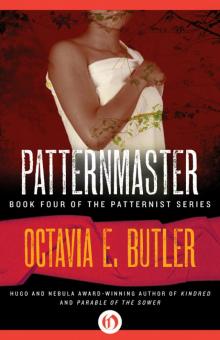 Patternmaster
Patternmaster Survivor
Survivor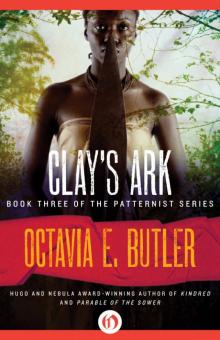 Clay's Ark
Clay's Ark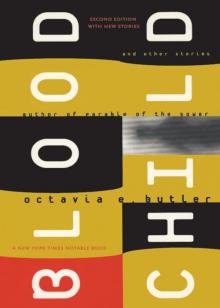 Bloodchild and Other Stories
Bloodchild and Other Stories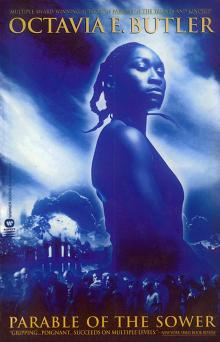 Parable of the Sower
Parable of the Sower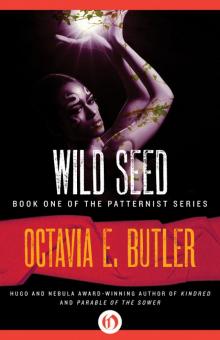 Wild Seed
Wild Seed Fledgling
Fledgling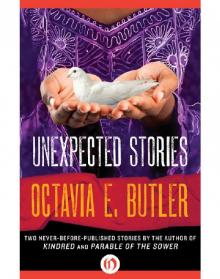 Unexpected Stories
Unexpected Stories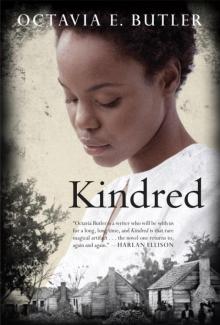 Kindred
Kindred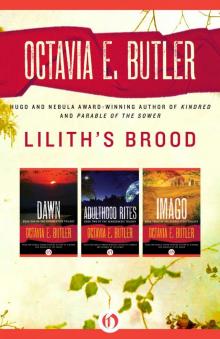 Lilith's Brood: Dawn / Adulthood Rites / Imago
Lilith's Brood: Dawn / Adulthood Rites / Imago Adulthood Rites
Adulthood Rites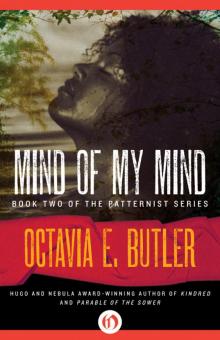 Mind of My Mind
Mind of My Mind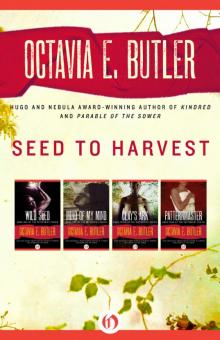 Seed to Harvest
Seed to Harvest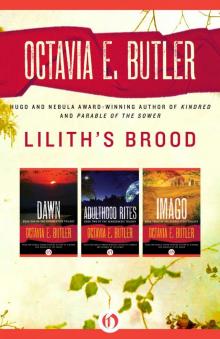 Lilith's Brood: Dawn, Adulthood Rites, and Imago (Xenogenesis Trilogy)
Lilith's Brood: Dawn, Adulthood Rites, and Imago (Xenogenesis Trilogy) Bloodchild
Bloodchild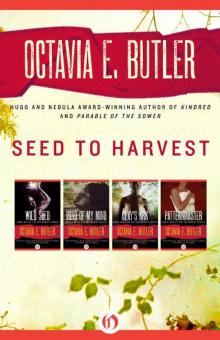 Seed to Harvest: Wild Seed, Mind of My Mind, Clay's Ark, and Patternmaster (Patternist)
Seed to Harvest: Wild Seed, Mind of My Mind, Clay's Ark, and Patternmaster (Patternist)